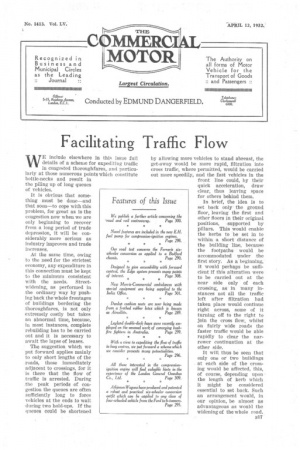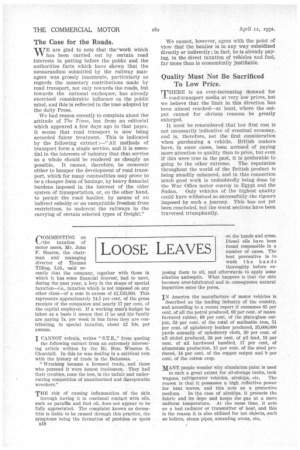Facilitating Traffic Flow
Page 35

Page 36

If you've noticed an error in this article please click here to report it so we can fix it.
WE include elsewhere in this issue full details of a scheme for expediting traffic in congested thoroughfares,, and particularly at those numerous points which constitute bottle-necks and result in the piling up of long queues of vehicles.
It is obvious that something must be done—and that soon—to cope with this problem, for great as is-the congestion now when we are only beginning to recover from a long period of trade depression, it will be considerably more 'serious as industry improves and trade increases.
At the same time, owing to the need for the strictest economy, any expenditure in this connection must be kept to the minimum consistent with the needs. Streetwidening, as performed in the ordinary way by pushing back the whole frontages of buildings bordering the thoroughfares, is not only extremely costly but takes an abnormal time, because, in most instances, complete rebuilding has to be carried • out and it is necessary to await the lapse of leases.
The suggestion which we put forward applies mainly to only short lengths of the .roads, those immediately adjacent to crossings, for it 'is there that the flow of .traffic is arrested. During the peak periods of congestion the queues are often sufficiently long to force vehicles at the ends to wait • during two hold-ups. If the queues could be shortened by allowing more vehicles to stand abreast, the get-away would be more rapid, filtration into cross traffic, where permitted, would be carried out more speedily, and the fast vehicles in the front line could, by their quick acceleration, draw clear, thus leaving space for others behind them.
In brief, the idea is to set back only• the ground floor, leaving the first and other floors in their original positions, supported by pillars. This would enable the kerbs to be set in to within a short distance of the building line, because the footpaths would be accommodated under the first story. As a' beginning, it would perhaps be sufficient if this alteration were to be carried out at the near side only of each crossing, as in many instances not all the traffic left after filtration had taken place would continue right across, some of it turning off to the right to join the cross flow, whilst on fairly wide roads the faster traffic would be able rapidly to clear the narrower continuation at the other side.
It will, thus be seen that only one or two buildings at each side of the crossing would be affected, this, of course, depending upon the length of kerb which it might be considered essential to set back. Such an arrangement would, in our opinion, be almost as advantageous as would the widening of the whole road.
The Case for the Roads.
WE are glad to note that the'work which has been carried out by certain road interests in putting before the public and the authorities facts which have shown that the memorandum submitted by the railway managers was grossly inaccurate, particularly as regards the monetary contributions made by road transport, not only towards the roads, but towards the national exchequer, has already exercised considerable influence on the public mind, and this is reflected in the tone adopted by the daily Press.
We had reason recently to complain about the attitude of The Times, but from an editorial which appeared a few days ago in that paper, it seems that road transport is now being accorded fairer treatment. This is indicated by the following extract :—" All methods of transport form a single service, and it is essential in the interests of industry that that service as a whole should be rendered as cheaply as possible. It cannot, therefore, be economic either to hamper the development of road transport, which for many commodities may prove to be a cheaper form of haulage, by heavy financial burdens imposed in the interest of the older system of transportation, or, on the other hand, to permit the road haulier, by means of an indirect subsidy or an unequitable freedom from restrictions, to undercut the railways in the carrying of certain selected types of freight." We cannot, however, agree with the point of view that the haulier is in any way subsidized directly or indirectly ; in fact, he is already paying, in the direct taxation of vehicles and fuel, far more than is economically justifiable.
Quality Must Not Be Sacrificed To Low Price.
ripHERE is an ever-increasing demand for -1road-transport media at very low prices, but we believe that the limit in this direction has been almost reached—at least, where the output cannot for obvious reasons be greatly enlarged.
It must be remembered that low first cost is not necessarily indicative of eventual economy, and is, therefore, not the first consideration when purchasing a vehicle. British makers have, in some cases, been accused of paying more attention to quality than to price, but even It this were true in the past, it is preferable to going to the other extreme. The reputation throughout the world of the British product is being steadily enhanced, and in this connection much good work is undoubtedly being done by the War Office motor convoy in Egypt and the, Sudan. Only vehicles of the highest quality could have withstood so successfully the rigours imposed by such a journey. This has not yet been concluded, but I he worst sections have been traversed triumphantly.




































































































